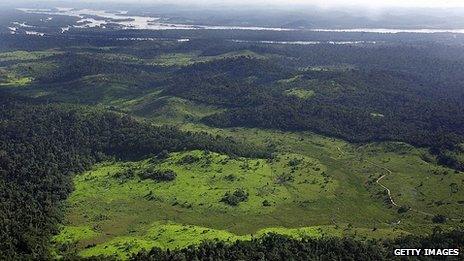Climate targets 'risk' from Brazil's forest changes
- Published

Observers say the bill is likely to lead to future deforestation
Brazil's new Forest Code means it will struggle to meet its targets on curbing greenhouse emissions, according to a former environment minister.
On the sidelines of the UN climate talks in South Africa, Marina Silva said the move will also reduce Brazil's global leadership on forests.
The Senate passed the new Forest Code late on Tuesday.
It will reduce the size of buffer zones around rivers, and weaken the amount of land that owners must leave forested.
Past breaches will not be punished if perpetrators agree to a plan of ecological restoration.
"The approved law will make it difficult - and by a lot - for Brazil to keep their emission targets," Ms Silva told reporters.
"The bill offers an amnesty to deforesters, reduces forest protection, and will lead to future deforestation."
Ms Silva, who grew up in a rubber-tapping community alongside prominent activist Chico Mendes, entered office under President Lula in 2003 before quitting in 2008 to launch her own unsuccesful presidential bid.
She called on President Dilma Rousseff to veto the changes.
Cuts 'on track'
In 2009, Brazil pledged to reduce the rise in its greenhouse gas emissions through a range of measures, chief among them a cut in the deforestation rate.
If they work, emissions in 2020 will be about 37% lower than they would have been if none of these measures had been enacted.
Deforestation in the Amazon is supposed to fall by 80% in the Amazon and 40% in the Cerrado.
At the UN conference, Brazil's chief climate official Eduardo Assad told BBC News that the country was already on track to meet about 65% of the target.
On Monday, the National Institute for Space Research (Inpe) reported an 11% drop in Amazon deforestation rate.
But, said Mr Assad, the impact of the new code was not yet clear.
"The team at the Ministry of Environment is currently examining the effects of this piece of legislation, and in the near future will be able to have a clearer view of what it will imply," he said.
Analysis has been made more difficult by the fact that the precise terms of the draft code have changed many times since it initially entered the lower house of parliament earlier in the year.
It must go back to the lower house and be signed off by the president before becoming law.
The Ruralist bloc of parliamentarians, which first proposed the changes in the 46-year old code, believes it will increase Brazil's food production and simplify rules for farmers.
But environment groups believe it will damage forests, rivers and wildlife.
"The increasing polarisation and hard line views between environmentalists and agribusiness are false extremes," said Fabio Scarano, executive director for Conservation International in Brazil.
"Brazil can continue to maintain its high level of food production and also maintain its massive forest carbon stocks."
Ms Silva said the ripples might extend beyond Brazilian shores.
"Brazil acts as a model and inspiration for other forest nations, such as Papua New Guinea, Malaysia and Indonesia," she said.
"If [our domestic regulations] are weakened, it takes away our leadership."
Europe 'united'
At the UN climate talks themselves, diplomatic activity stepped up a notch as most countries' ministers arrived.
The single biggest key to the outcome still appears to be China.
But how far it is prepared to go towards meeting the ambition set out by the EU, the small island states and the Least Developed Countries, of setting a firm and quick timeline for negotiations on a new global agreement, is still unclear.
Several delegates told BBC News that a number of outcomes were still possible, although one experienced observer, asked for his prediction, answered: "A car-crash".
Environment groups are appealing to the EU to stand firm in its demands for a firm timeline towards a strong global deal, in return for which it is prepared to sign up for a second round of emission cuts under the Kyoto Protocol.
US negotiators are said to believe the EU will "cave" at the last minute, though Chris Huhne, the UK's Climate Secretary, said that a recent co-ordination meeting of EU ministers showed that was not the case.
"I'm very pleased at how we were all on the same page, that we all understood what's in play here, and that the EU displayed remarkable unity."
In one further forest development, seven African nations and eight western partners signed a Declaration of Intent on the Congo Basin Initiative, a plan to safeguard the world's second-largest expanse of rainforest.
Follow Richard on Twitter, external
- Published5 December 2011
- Published23 November 2011
- Published21 October 2011